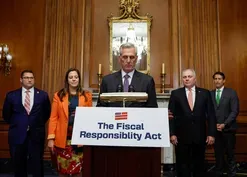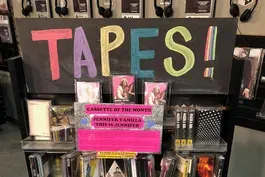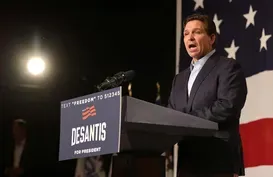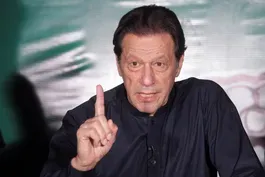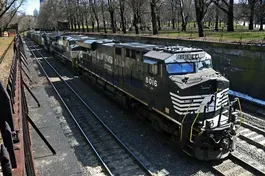
Report: Prosecutors have audio of Trump discussing documents
Clip: 6/1/2023 | 6m 45sVideo has Closed Captions
Prosecutors have audio of Trump discussing classified documents he kept, reports say
Federal prosecutors have a recording of former President Trump discussing a classified Pentagon document he kept after leaving office, multiple outlets report. In the 2021 recording, which the NewsHour has not independently verified, Trump says the document details a potential attack on Iran. Laura Barrón-López discussed the DOJ's investigation into the former president with Oona Hathaway.
Problems with Closed Captions? Closed Captioning Feedback
Problems with Closed Captions? Closed Captioning Feedback
Major corporate funding for the PBS News Hour is provided by BDO, BNSF, Consumer Cellular, American Cruise Lines, and Raymond James. Funding for the PBS NewsHour Weekend is provided by...

Report: Prosecutors have audio of Trump discussing documents
Clip: 6/1/2023 | 6m 45sVideo has Closed Captions
Federal prosecutors have a recording of former President Trump discussing a classified Pentagon document he kept after leaving office, multiple outlets report. In the 2021 recording, which the NewsHour has not independently verified, Trump says the document details a potential attack on Iran. Laura Barrón-López discussed the DOJ's investigation into the former president with Oona Hathaway.
Problems with Closed Captions? Closed Captioning Feedback
How to Watch PBS News Hour
PBS News Hour is available to stream on pbs.org and the free PBS App, available on iPhone, Apple TV, Android TV, Android smartphones, Amazon Fire TV, Amazon Fire Tablet, Roku, Samsung Smart TV, and Vizio.
Providing Support for PBS.org
Learn Moreabout PBS online sponsorshipAMNA NAWAZ: Federal prosecutors have a recording of former President Donald Trump discussing a classified Pentagon document he kept after leaving office, multiple outlets report.
Laura Barron-Lopez takes a deeper look at the former president's legal battle.
LAURA BARRON-LOPEZ: In the 2021 recording, which the "NewsHour" has not independently verified, Trump says the document details a potential attack on Iran.
Trump also acknowledged he retained the sensitive document after leaving the White House, representing a potentially significant piece of the Justice Department's investigation into the former president.
Joining me now to discuss is Oona Hathaway, a professor at Yale Law School and former special counsel at the Pentagon.
Oona, thanks so much for joining us.
The recording reportedly shows Mr. Trump knowing that the document he kept was classified.
How significant is that?
OONA HATHAWAY, Yale Law School: It's very significant, for at least two reasons.
So, first, it makes clear that he did not, contrary to his claims, actually declassify or even think that he declassified everything before he left office.
So one thing he said is he didn't unlawfully retain classified documents because he just declassified everything before he took it away to Mar-a-Lago.
This recording makes clear that he knows that at least some of the documents he retained are classified.
And, second, it makes clear that he did it knowingly.
He knows that these are classified documents.
He knows he's holding on to classified documents.
And that's really essential to the criminal case against him.
LAURA BARRON-LOPEZ: According to this recording, Trump said that he wanted to share the information in this document, but understood the potential legal limitations.
Could this apply to the DOJ's investigation into a potential Espionage Act violation?
OONA HATHAWAY: Yes, so the Espionage Act covers a range of activities with regard to classified information.
So, the particular provision that he might be charged with provides that, if somebody doesn't have lawful access to a classified document, which somebody who is out of office, like even a former president, doesn't have lawful access to the document, if they retain, prevent the government from having access to and continue to hold classified documents, even if they don't intend to transmit them, so just last knowingly holding on to these documents is a violation of the Espionage Act.
And so it's clear, even if he didn't intend to transmit them, that he's effectively admitting to a violation of the Espionage Act.
LAURA BARRON-LOPEZ: And this document had to do with, as we said, a potential attack on Iran.
And we should note that we don't know at all whether or not there is any type of potential U.S. attack on Iran.
But recent reports also found that Mar-a-Lago -- at Mar-a-Lago, there was a maintenance worker who testified to the Justice Department that they saw a Trump aide moving boxes to a storage room the day before a meeting that was supposed to be held last year between Trump's lawyers, as well as Justice Department officials.
What is the relevance of that legally?
OONA HATHAWAY: Yes, well, this suggests that -- what Trump has been saying is, these were documents were his, and none of them were classified.
And so this recording suggests that these documents that he knows he was holding on to, he knows he took them with him from the White House to Mar-a-Lago.
He's holding on to them, and he says, well, I'm just moving them around.
I'm just storing them.
Well, this evidence suggests that he knew that those documents were classified, or at least some of those documents were classified.
And then, when he's ordering them to be moved and stored, it does suggest that he's attempting to conceal them from the federal government.
And remember that the government had been asking for these documents back.
The National Archives had recognized the documents were missing, and have requested the president turn them over.
The president was insisting that they belong to him.
Now this recording suggests he knows our classified.
Classified documents can't belong to somebody who doesn't have lawful access to those documents and who's out of office.
Those are, by definition, presidential records.
So it really is evidence that all these things that have been leaking out, kind of together with this recording, suggests that, in fact, the president knew he was unlawfully retaining these documents, he knew that they were classified, and he knew that, if he continued to hold them and conceal them from the government, that he would be violating the law.
LAURA BARRON-LOPEZ: The fact that a Trump aide appeared to move some of these classified documents to a storage room, could that apply to the potential obstruction charge?
OONA HATHAWAY: Yes, so obstruction of justice requires that he knowingly retain and conceal documents that are relevant to an ongoing investigation.
And the fact that he knew that these documents or at least some of these documents are classified -- now, we don't know if this particular documents that he's referring to in this recording are in those boxes that were moved.
But it does suggest he knows that many of the documents that he's retaining were classified, and that he was intentionally moving them in order, it seems, to avoid the FBI obtaining them and keep them from the National Archives.
And so that is suggestive of a violation of the obstruction of justice, because that requires knowingly -- and this recording suggests that he knew precisely what he was doing.
LAURA BARRON-LOPEZ: When you take all of these facts together, do you think that the Justice Department is going to ultimately charge the former president?
OONA HATHAWAY: I think it makes it very hard for them not to, frankly.
I mean, there have been lots of people who have gone to jail for much less.
Reality Winner, who recently was released from prison, went to jail for retaining a single document and transmitting it to a -- to The Intercept.
That was one document.
And this seems to be much more than that.
And this is clear evidence that the president knew what he was doing, he knew that he was retaining them, that they retained -- they remained classified, and they had real likelihood of being able to do damage to U.S. national security, which is the definition of national defense information in the Espionage Act.
So I think it actually makes it hard for a prosecutor not to bring a case, given how clear the evidence is.
LAURA BARRON-LOPEZ: Oona Hathaway, a professor at Yale Law School and former special counsel at the Pentagon, thank you so much.
OONA HATHAWAY: Thank you so much.
Bill to raise debt ceiling awaits final passage in Senate
Video has Closed Captions
Clip: 6/1/2023 | 7m 10s | Bill to raise federal debt ceiling awaits final passage in Senate (7m 10s)
Cassette tapes make comeback in era of music streaming
Video has Closed Captions
Clip: 6/1/2023 | 6m 22s | Cassette tapes make unexpected comeback in era of music streaming (6m 22s)
GOP presidential candidates hit key states as race heats up
Video has Closed Captions
Clip: 6/1/2023 | 11m 8s | Republican presidential candidates travel to key states as 2024 race heats up (11m 8s)
Imran Khan discusses government crackdown on his party
Video has Closed Captions
Clip: 6/1/2023 | 8m 13s | Pakistan's ousted Prime Minister Imran Khan discusses government crackdown on his party (8m 13s)
Long trains cause problems for communities near crossings
Video has Closed Captions
Clip: 6/1/2023 | 6m 57s | Miles-long freight trains cause problems for communities near railroad crossings (6m 57s)
Providing Support for PBS.org
Learn Moreabout PBS online sponsorshipSupport for PBS provided by:
Major corporate funding for the PBS News Hour is provided by BDO, BNSF, Consumer Cellular, American Cruise Lines, and Raymond James. Funding for the PBS NewsHour Weekend is provided by...
